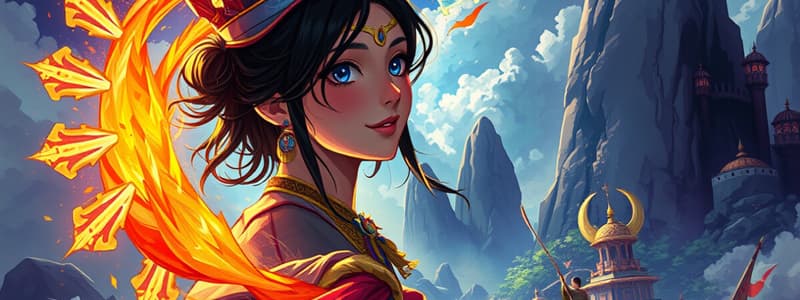Podcast
Questions and Answers
Which statement best reflects the author's view of their heritage?
Which statement best reflects the author's view of their heritage?
- The author feels disconnected from their ancestors.
- The author's heritage is solely composed of Filipino influences.
- The author's lineage includes a diverse mix of cultural influences. (correct)
- The author's heritage is primarily European.
How does the author view their identity as a Filipino?
How does the author view their identity as a Filipino?
- As a choice rather than a birthright.
- As a unified and integral part of a larger community. (correct)
- As a burden due to historical struggles.
- As an individualistic perspective disconnected from society.
What is described as reflecting the author's pride?
What is described as reflecting the author's pride?
- The richness of their land and natural resources. (correct)
- The influence of modern technology.
- The ancient history of the islands.
- The historical conflicts with colonizers.
What does the author mean by 'a marriage of flags'?
What does the author mean by 'a marriage of flags'?
Which quality does the author express was inherited from their ancestors?
Which quality does the author express was inherited from their ancestors?
What central belief about humanity does the author express?
What central belief about humanity does the author express?
Which imagery is used to describe the natural beauty of the Philippines?
Which imagery is used to describe the natural beauty of the Philippines?
What does the author imply about their beliefs regarding the future?
What does the author imply about their beliefs regarding the future?
In what way does the author relate personal identity to land?
In what way does the author relate personal identity to land?
What role does the author attribute to peace in society?
What role does the author attribute to peace in society?
Flashcards are hidden until you start studying
Study Notes
National Identity and Heritage
- The speaker expresses pride in being Filipino, emphasizing the vibrant and sun-drenched islands of the Philippines.
- Describes the rich ancestry, claiming descent from sultans, rajahs, kings, soldiers, and heroes who championed freedom.
Cultural Landscape
- The home is metaphorically depicted as a living entity, comprising volcanic rock and shells, rich in agricultural bounty like rice, corn, and coconuts.
- Natural elements like mighty rivers and towering trees represent strength and resilience.
Historical Influences
- Cultural identity is a blend of diverse influences (Malay, Chinese, Spanish, American, Japanese).
- The collective history includes the remnants of conquered nations, evoking themes of desire, empire, and lost ambitions.
Unity and Community
- Emphasizes a deep sense of duty towards fellow Filipinos, reflecting solidarity with thirty million brown-skinned individuals.
- The imagery of a caravan signifies movement and shared purpose in building a democratic heritage.
Spiritual Beliefs
- The speaker's faith influences a belief in goodness, charity, and reconciliation as solutions to humanity's struggles.
- Identity as a Christian shapes the view of all people as brothers, promoting love and understanding.
National Symbolism
- Affirms belief in the Philippine flag, with each color representing a history marked by courage, sacrifice, and the fight against oppression.
- Asserts the nobility of the Filipino people as stewards of equality and freedom.
Appreciation for Nature
- Celebrates the natural beauty of the Philippines: mountains, lakes, rivers, and beaches contribute to a sense of abundance and happiness.
- Nature embodies hope, symbolizing the vitality and spirit of the Filipino people.
Concluding Pride
- The culmination of sentiments illustrates a profound pride in Filipino identity, culture, and the promise of a hopeful future.
Studying That Suits You
Use AI to generate personalized quizzes and flashcards to suit your learning preferences.




